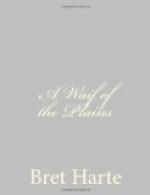“Yes,” said Clarence wearily. “Good-by.”
“Hullo, sonny, where are you going?”
“To dig gold,” said the boy. “And you know you can’t prevent me, if it isn’t on your claim. I know the law.” He had heard Mr. Peyton discuss it at Stockton, and he fancied that the men, who were whispering among themselves, looked kinder than before, and as if they were no longer “acting” to him. The first speaker laid his hand on his shoulder, and said, “All right, come with me, and I’ll show you where to dig.”
“Who are you?” said Clarence. “You called yourself only ‘me.’”
“Well, you can call me Flynn—Tom Flynn.”
“And you’ll show me where I can dig—myself?”
“I will.”
“Do you know,” said Clarence timidly, yet with a half-conscious smile, “that I—I kinder bring luck?”
The man looked down upon him, and said gravely, but, as it struck Clarence, with a new kind of gravity, “I believe you.”
“Yes,” said Clarence eagerly, as they walked along together, “I brought luck to a man in Sacramento the other day.” And he related with great earnestness his experience in the gambling saloon. Not content with that—the sealed fountains of his childish deep being broken up by some mysterious sympathy—he spoke of his hospitable exploit with the passengers at the wayside bar, of the finding of his Fortunatus purse and his deposit at the bank. Whether that characteristic old-fashioned reticence which had been such an important factor for good or ill in his future had suddenly deserted him, or whether some extraordinary prepossession in his companion had affected him, he did not know; but by the time the pair had reached the hillside Flynn was in possession of all the boy’s history. On one point only was his reserve unshaken. Conscious although he was of Jim Hooker’s duplicity, he affected to treat it as a comrade’s joke.
They halted at last in the middle of an apparently fertile hillside. Clarence shifted his shovel from his shoulders, unslung his pan, and looked at Flynn. “Dig anywhere here, where you like,” said his companion carelessly, “and you’ll be sure to find the color. Fill your pan with the dirt, go to that sluice, and let the water run in on the top of the pan—workin’ it round so,” he added, illustrating a rotary motion with the vessel. “Keep doing that until all the soil is washed out of it, and you have only the black sand at the bottom. Then work that the same way until you see the color. Don’t be afraid of washing the gold out of the pan—you couldn’t do it if you tried. There, I’ll leave you here, and you wait till I come back.” With another grave nod and something like a smile in the only visible part of his bearded face—his eyes—he strode rapidly away.




